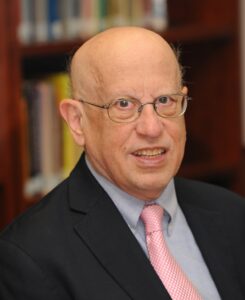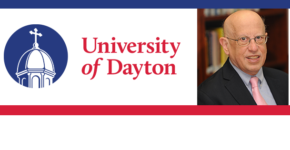 Social media platforms face the Supreme Court in a big decision for public officials.
Social media platforms face the Supreme Court in a big decision for public officials.
Charles Russo, research professor of law at the University of Dayton, explains the importance of this case.
Charles Russo is the Joseph Panzer Chair in Education in the UD School of Education and Health Sciences, Director of its Ph.D. Program, and Research Professor of Law in the UD School of Law. The 1998-99 President of the Education Law Association, and 2002 recipient of its McGhehey (Achievement) Award, Russo has authored or co-authored more than 325 articles in peer-reviewed journals; authored, co-authored, edited, or co-edited 73 books, and has more than 1,100 publications focusing on issues in Education Law. He has spoken extensively on issues in Education Law in the United States and other countries. In addition, he edits two academic journals and has serves on more than one dozen editorial boards.
Along with having spoken in 34 states and 31 countries outside of the U.S. on six continents, Russo has taught summer courses in England, Spain and Thailand. He has served as a Visiting Professor at Queensland University of Technology (Brisbane) and the University of Newcastle (Australia); the University of Sarajevo (Bosnia and Herzegovina); South East European University (Macedonia); the Potchefstroom and Mafeking Campuses of Northwest University (Potchefstroom, South Africa); the University of Malaya (Kuala Lumpur, Malaysia); the University of Sao Paulo (Brazil); Yeditepe University (Istanbul Turkey); Inner Mongolia University for the Nationalities (Tongliao, Inner Mongolia); and Peking University (Beijing, China). He is currently a Visiting Professor at Capital Normal University (Beijing) and the Faculty of Law at Notre Dame University of Australia, Sydney campus.
Before joining the UD faculty as Professor and Chair of the Department of Educational Administration in July 1996, Dr. Russo taught at the University of Kentucky (Lexington, KY) from August 1992 to July 1996 and at Fordham University (New York City) from September 1989 to July 1992. He taught high school for eight and a half years, both prior to and after graduation from law school. He received a Bachelor of Arts degree in Classical Civilization (1972), Juris Doctor Degree (1983), and Doctor of Education degrees in Educational Administration and Supervision (1989) from St, John’s University (New York City). He received a Master of Divinity degree from the Seminary of the Immaculate Conception (Huntington, New York) (1978). He received a Ph.D. Honoris Causa from Potchefstroom University, now the Potchefstroom Campus of Northwest University (Potchefstroom, South Africa) (2004) for his contributions to the field of Education Law
State Action, Social Media and the Supreme Court
A key question before the Supreme Court is whether school board members in California and a public official in Michigan, and by extension, all public officials can block users and delete their critical comments.
At issue is what constitutes state action – or action taken in an official governmental capacity – on social media. Under the First Amendment, officials engaging in state action cannot restrict individuals’ freedom of speech and expression.
A ruling in these cases, O’Connor-Ratcliff v. Garnier and Lindke v. Freed, which reached opposite results is likely to come in spring or early summer 2024. The results could have broad implications for the nearly three-fourths of Americans who use social media in daily lives. The ruling could also set rules on whether social media accounts of public officials are be treated as personal or governmental speech.
Both cases not only have consequences for citizens’ First Amendment rights but also for social media companies and users. The Court may decide whether social media platforms such as Facebook and X can be liable for allowing a public official to block private citizens from commenting on their accounts.
These cases might also establish rules and standards about how public officials can control their social media accounts and the role and the role of the courts in these disputes.
Depending on how the Supreme Court rules, social media may be headed into a new era of who can access and comment on the accounts of public officials.
